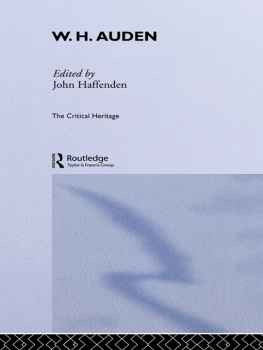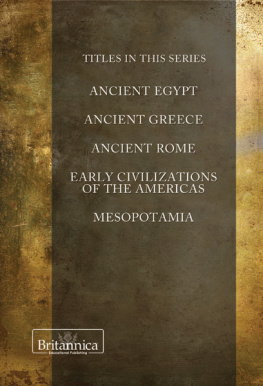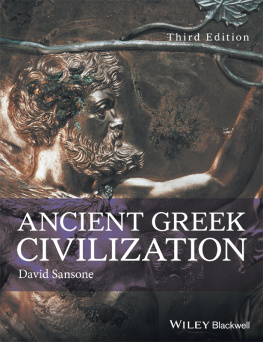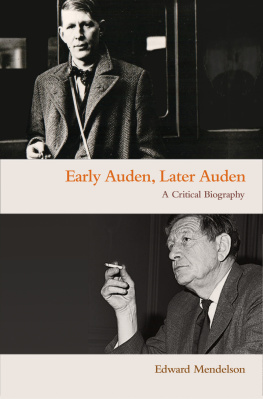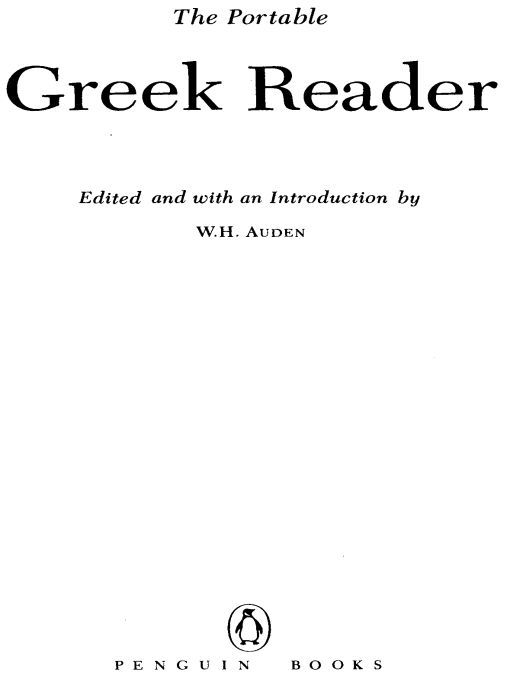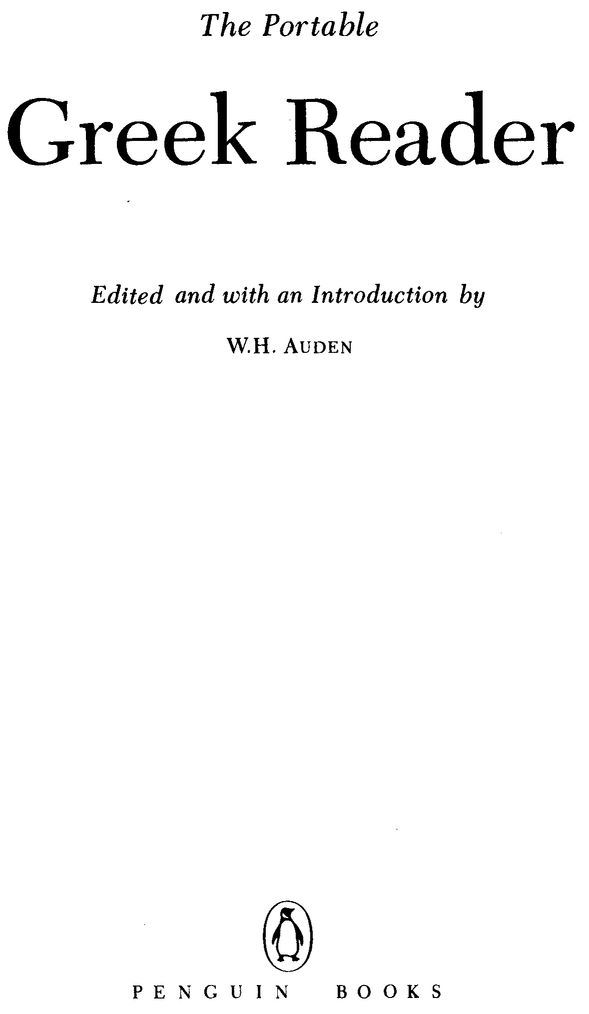Table of Contents
THE VIKING PORTABLE LIBRARY
The Greek Reader
Wystan Hugh Auden was born in York, England, on February 21, 1907. His family moved to Birmingham during his early childhood. He was educated at Greshams School, Holt, and at Christ Church, Oxford. His first book of poems, published in 1930, had an immediate and vital effect on English letters. During the 1930s he completed two more books of poems, collaborated on three plays with Christopher Isherwood, and wrote books about his travels to Iceland (with Louis MacNeice) and to the war in China (with Christopher Isherwood). In 1939 he took up residence in New York, and he became an American citizen in 1946. His work during the 1940s included the longer poems New Year Letter, For the Time Being, The Sea and the Mirror, and The Age of Anxiety. In collaboration with Chester Kallman he composed opera libretti for Igor Stravinsky, Hans Werner Henze, and Nicolas Nabokov. From 1948 through 1957 he lived for part of the year in Ischia, and from 1957 onwards in Kirchstetten, Lower Austria. In 1972 he left his winter home in New York to return to Oxford. He died in Vienna in the early hours of September 29, 1973. Audens books include the five-volume Viking Portable Library Poets of the English Language, edited in collaboration with Norman Holmes Pearson.
Each volume in The Viking Portable Library either presents a representative selection from the works of a single outstanding writer or offers a comprehensive anthology on a special subject. Averaging 700 pages in length and designed for compactness and readability, these books fill a need not met by other compilations. All are edited by distinguished authorities, who have written introductory essays and included much other helpful material.
EDITORS INTRODUCTION
ONCE upon a time there was a little boy. Before he could read, his father told him stories about the War between the Greeks and the Trojans. Hector and Achilles were as familiar to him as his brothers, and when the Olympians quarreled he thought of his uncles and aunts. At seven he went to a boarding school and most of the next seven years were spent in translating Greek and Latin into English and vice versa. Then he went on to another boarding school which had a Classical Side and a Modem Side.
The latter was regarded by boys and masters alike in much the same way as; in a militarist country, civilians are regarded by officers, and with the same kind of degrees of inferiority: history and mathematics were, like professional men, possible; the natural sciences, comprehensively labeled Stinks, like tradesmen were not. The Classical Side, too, had its nice distinctions: Greek, like the Navy, was the senior, the aristocratic service.
It is hard to believe now that this story is not a fairy tale but a historical account of middle-class education in England thirty-five years ago.
For anyone brought up in this way, Greece and Rome are so mixed up with his personal memories of childhood and classroom that it is extremely difficult to look at these civilizations objectively. This is particularly so, perhaps, in the case of Greece. Until near the end of the eighteenth century, Europe thought of itself less as Europe than as Western Christendom, the heir to the Roman Empire, and its educational system was based on the study of Latin. The rise of Hellenic studies to an equal and then a superior position was a nineteenth century phenomenon and coincided with the development of European nations and nationalist feeling.
It is significant, surely, that when, today, an after-dinner speaker refers to the sources of our civilization, he always names Jerusalem and Athens, but rarely Rome, for the last is the symbol of a religious and polit ical unity which has ceased to exist and the revival of which few believe in or desire. The historical discontinuity between Greek culture and our own, the disappearance for so many centuries of any direct influence, made it all the easier, when it was rediscovered, for each nation to fashion a classical Greece in its own image. There is a German Greece, a French Greece, an English Greecethere may even be an American Greeceall quite different. Had Hlderlin met Jowett, for instance, one suspects that neither would have understood a word the other said, and their parting would have been cold.
Even within a single country different Greeces coexist. For instance here are two English caricatures:
Professor X. Reade Chair of Moral Philosophy. 59. Married. Three daughters. Religion: C of E (Broad). Politics: Conservative. Lives in a small suburban house stuffed with Victorian knickknacks. Does not entertain. Smokes a pipe. Does not notice what he eats. Hobbies: gardening and long solitary walks. Dislikes: foreigners, Roman Catholicism, modem literature, noise. Current worry: his wifes health.
Mr. Y. Classical tutor. 41. Unmarried. Religion: none. Politics: none. Lives in college. Has private means and gives wonderful lunch parties for favorite undergraduates. Hobbies: travel and collecting old glass. Dislikes: Christianity, girls, the poor, English cooking. Current worry: his figure.
To X, the word Greece suggests Reason, the Golden Mean, emotional control, freedom from superstition; to Y it suggests Gaiety and Beauty, the life of the senses, freedom from inhibitions.
Of course, being good scholars, both know that their respective views are partial; X cannot deny that many Greeks were attracted to mystery cults and addicted to habits upon which the common moral sense of civilized mankind has pronounced a judgement which requires no justification as it allows of no appeal; Y is equally aware that the Plato of the Laws is as puritanical as any Scotch Presbyter; but the emotional tie to the Greece of their dreams, formed in childhood and strengthened by years of study and affection, is stronger than their knowledge.
There could be no stronger proof of the riches and depth of Greek culture than its powers of appeal to every kind of personality. It has been said that everyone is born either a Platonist or an Aristotelian; but it seems to me that there are more contrasted and significant divisions than this, between, for instance, the lovers of Ionia and the lovers of Sparta, between those who are devoted to both Plato and Aristotle and those who prefer Hippocrates and Thucydides to either.
II
The days when classical studies were the core of higher learning have now passed and are not likely, in any future we can envisage, to return. We have to accept as an accomplished fact that the educated man of today and tomorrow can read neither Latin nor Greek. This means, I think, that, if the classics are to continue to exert any educational effect at all, a change must be made in the emphasis and direction of Roman and Hellenic studies.
If Greek literature has to be read in translation, then the approach can no longer be an aesthetic one. The aesthetic loss in translation from one language into another is always immense; in the case of languages and cultures as far apart as Greek and English, it becomes practically fatal; one can almost say that the better a translation is as English poetry, the less like Greek poetry it is (e.g., Popes Iliad) and vice versa.
To begin with there is the prosodic difficulty; quantitative unrhymed verse and qualitative rhymed verse have nothing in common except that they are both rhythmical patterns. An English poet can have much fun attempting, as a technical exercise or an act of piety, to write quantitatively:


